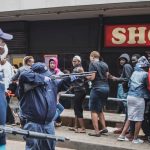“Obviously Zimbabwe does not fulfil any of these criteria, so extending the lockdown seems necessary. The spread of Covid-19 is probably just starting in Zimbabwe. Our health services are not equipped to handle a large pandemic, therefore containing its spread is still vital,” Veritas said.
“But it needs careful thought and plans put in place. It also needs government to fully explain their decisions. Authoritarian governments find it easier to impose their decisions on their people but in democracies, governments need to carry the people with them in their decisions.
“There is no doubt that Covid-19 is having a deadly impact on the economies of all countries affected by it and the subsequent lockdowns are necessary to prevent its spread. Even in rich countries the choice seems to be between peoples’ lives or a plummeting economy.
“Most countries have put the lives and health of their citizens first, but in a poor country where there are desperate food shortages the choice is more complex.
“In Zimbabwe, where most people are in the informal economy, the impact of lockdown on their livelihoods and their networks of dependants is very great. Social and economic cushioning is very limited in Zimbabwe, as in other poorer countries.
“Many countries have had to use their security forces – usually police – to enforce lockdown restrictions, but when people are forced to break restrictions to get food or water conflict between security forces and citizens can become acute.
“In Zimbabwe the conduct of the police was criticised by the President after officers were filmed burning vegetables confiscated from farmers in Mutare. President Mnangagwa then said it was critical that food markets be allowed to function during the national lockdown.
“As a consequence food markets have been exempted from the tough lockdown regulations, though this exemption has been done administratively rather than through an amendment of the relevant law. It would have been better if the exemption had been planned in advance rather than granted off the cuff, as it were.
“Food markets are crowded and social distancing is not observed, and when the exemption was granted no provision was made to protect the people thronging to them. The police themselves have obviously not been told to take precautions and practise social distancing.”
Zimbabwe has so far recorded 23 cases of coronavirus. It only had 11 cases a week ago.
(244 VIEWS)


